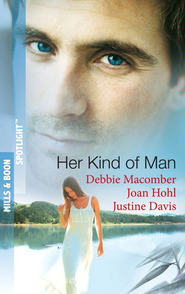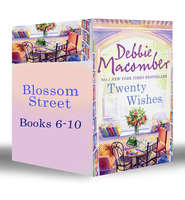По всем вопросам обращайтесь на: info@litportal.ru
(©) 2003-2025.
✖
Angels at Christmas: Those Christmas Angels / Where Angels Go
Автор
Год написания книги
2018
Настройки чтения
Размер шрифта
Высота строк
Поля
“So you are admitting responsibility,” she challenged, hands on her hips.
“No,” he said in a flat, businesslike tone.
“You don’t have to worry. I have no intention of suing you.”
He didn’t respond as he opened the passenger door. “Get in,” he said curtly.
“Where are you taking me?”
“To my personal physician.”
“I said I’m not hurt.”
“I know what you said. Now are you going to do as I ask, or do I have to put you inside this car myself?”
Julie could see it was pointless to argue; he was determined to do things his way. “Oh, all right,” she said with a complete lack of graciousness.
He slipped into the driver’s seat and exhaled slowly. “Thank you.”
Julie crossed her arms and tried to stifle a laugh.
“What’s so funny?”
“Nothing.” But then she couldn’t help it and burst out laughing.
“What?”
“It’s you,” she said between peals of laughter. “You said ‘thank you.’ Were you thanking me for sparing you the effort of having to physically lift me?”
“No.” He apparently lacked even the most rudimentary sense of humor. “I was thanking you for not putting up any more of a fuss than you already have.”
He started the engine. “What are you doing here, anyway?”
Until he asked, she’d totally forgotten. “Dad’s lunch. It’s on the bike. He forgot it this morning and I was taking it to him.” She turned around and looked behind her, wondering if his lunch had somehow survived the collision. “I need to get it to him.”
“Your father can go without lunch—getting you to a doctor is more important at the moment.”
She glared at him, and he groaned audibly.
“Oh, all right.” Without her having to say another word, he drove up to the main entrance and parked. “Stay where you are,” Fletcher ordered.
“I wouldn’t dream of doing anything else,” she said with exaggerated sweetness.
He looked as though he doubted her, then quickly leaped out of the car. Removing her sorely bent and abused ten-speed, he leaned it against the building. She couldn’t see what he was doing, but a moment later, the side mirror on the passenger door gave her a brief view of him on his cell phone.
“Did you tell my dad I wasn’t hurt?” she asked when he got back in the car.
“No, I was talking to Dr. Wilbur.”
Great, just great. Her father would find her bike, a crumpled mess, and assume the worst. “Give me that phone.”
He stared at her as if no one ever spoke to him like that. “Please,” she added, realizing how rude she must sound. “I’ve got to tell Dad I’m all right. He won’t know what to think if he finds that.”
“By the way,” he said wryly, “his lunch did not sustain any mishap. The sandwich isn’t smashed at all. I thought you’d want to know.” He reached inside his jacket and handed her the cell, which was the tiniest phone she’d ever seen. It took Julie a few minutes to figure out how it worked.
Her father was away from his desk and once again she had to leave a message with someone else. She explained the situation and said he should collect his lunch from her bike.
“Are you happy now?” Fletcher asked when she’d finished her call and returned his phone.
“Ecstatic.”
“Good. Now sit back and relax.”
“Don’t be so bossy,” she muttered.
“Don’t be so stubborn.”
“This really isn’t necessary. I have no intention of suing,” she said, not for the first time.
“Good thing, because you’d lose.”
Julie thought she saw a hint of a smile. She looked again, certain she must be wrong. The high-and-mighty computer whiz was actually amused. Now this was something to write home about.
Anne Fletcher pulled the blanket around her shoulders as she attempted to fall to sleep. Opening one eye, she peered at the clock. Two in the morning. She should’ve been asleep hours ago. For no reason she could discern, she’d been having trouble sleeping. No matter what she did—read, drank warm milk, swallowed nighttime aspirin—she remained fully awake.
With a disgusted sigh, she tossed back the covers and reached for the switch on her lamp. She was wide-awake and any effort to sleep would be a waste of time. Her mind drifted to the memory of the angel who’d appeared to her. She leaned over to get her sketchbook from the bedside table and flipped the pages until she found what she wanted.
Anne was sure she’d imagined the visitation, and yet it had seemed so real. But none of this made sense. Why would an angel appear to her? Not a word had been spoken, not a sound uttered. But an angel had stood directly in front of her. So strong was the impression that even now Anne could feel the love emanating from the heavenly being.
To further confuse her, the image had lasted for several minutes, long enough for Anne to grab her sketchbook. Almost as if she was posing, the angel had stood perfectly still while Anne quickly outlined what was before her, unbelievable though it was.
“She was so beautiful,” Anne whispered as she studied the drawing with fresh eyes.
The urge to paint the image onto canvas suddenly gripped her. After a long day in her studio, she should be exhausted; instead, she was filled with excitement. Anne got out of bed. Dressed in her nightgown and slippers, she decided she’d paint until she felt tired. She’d get started and see how things went.
The studio was cold and dark, and she turned on the light, then hurried into the kitchen to make a pot of tea. Taking a pristine canvas from the pile stacked against the wall, she set it on the easel and stepped back. No, bigger. The angel who’d visited her couldn’t be displayed on such a small space. Searching through her supplies, Anne looked for the largest canvas she had.
She found one in a closet, bigger than anything she’d ever used before, and began to work. Thinking she’d soon grow tired, she didn’t pause. She painted through the night and didn’t stop until daylight. To her amazement, she noticed sunshine pouring in around her. She glanced at the clock on the wall. Almost eight! For the first time in her life she’d worked straight through the night.
“I’ll just take a quick break,” she told herself as she went back to bed. Exhausted, she climbed between the sheets and closed her eyes. Seven hours later, around three, she woke feeling refreshed and revitalized.
After showering and changing clothes, Anne resumed her painting. The next time she looked up, it was dark again. Shocked, she realized she hadn’t eaten in nearly thirty hours. The refrigerator provided a chunk of cheddar and a small cluster of seedless grapes, which she munched on hungrily. She made another pot of tea. Then it was back to work.
When she’d finished the painting, she saw daylight again; for the second night in a row, she’d worked without sleep. Stepping back, Anne examined her creation with a critical eye.
“Yes,” she whispered, awed by the painting before her.
This was her best work to date. She’d call it … Visitation. Smiling, she studied the painting from several angles.











